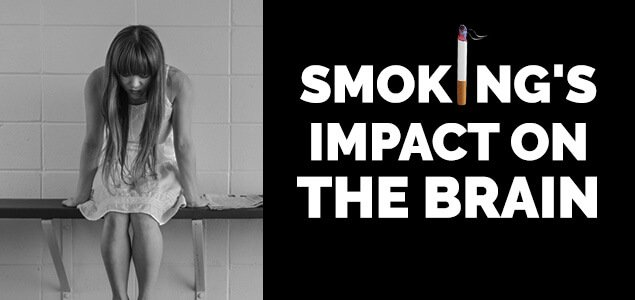Smoking’s Impact on the Brain

The smoking of tobacco products carries with it a myriad of adverse health complications and risks. One of the most significant areas in regards to these risks falls in the field of neuroscience. In addition to the host of disorders associated with the human body when it comes to smoking cigarettes, smoking’s effect on the central nervous system bears some of the most profound impacts.
Stimulant
Cigarettes act as a stimulant to the central nervous system. It profoundly affects the neurotransmitters acetylcholine, serotonin, GABA, dopamine, norepinephrine, and more. Out of the approximate 600 chemicals found in tobacco cigarettes, nearly 100 have been documented to have pharmacological effects on the human body, more specifically, on the central nervous system.
The nicotine found in tobacco smoke, or in the vapor from a vaporizer, can reach the brain in as little as eight seconds after being inhaled into the lungs. From there, it may act as the neurotransmitter acetylcholine, due to their resemblance in structure. Nicotine may manipulate specific receptors allowing it to control muscle movement, memory, respiration, and other functions.
[mig-qs-banner ][/mig-qs-banner]
Behavioral Augmentation
According to a study published by the National Library of Medicine, smoking’s effect on the central nervous system is considered to be neuro-regulatory. It affects biochemical and physiological functions in a way that is akin to behaviors associated with drug use. The strata of norepinephrine and epinephrine rises, while the bioavailability of dopamine is further modified. In the midst of the neuroendocrine effects, beta-endorphin, arginine vasopressin, cortisol, and adrenocorticotropic hormone are also released. Of these neurochemicals, a diverse few are psychoactive and therefore can adjust behavior.
According to Medscape, “Nicotine stimulates neuronal firing directly by acting at the binding sites or indirectly by causing the release of acetylcholine or monoaminergic neurotransmitters (such as dopamine, noradrenaline and serotonin). Nicotine can thus affect HPA function through a variety of paths.”
In the short-term, demands associated with cognitive functions or mental awareness may be augmented by the intake of nicotine, which is something that the best vapes aim to do. However, these effects are short-lived, and the damage is far-reaching. In the study previously mentioned, nicotine replacement therapies, such as nicotine gum, nicotine patches, and other nicotine replacement products that are in current use have a “slower onset of action, resulting in less reinforcement value.” It asserts that current data concludes that smoking cessation rates can be increased by customizing the nicotine doses according to the specific needs and degree of nicotine dependence. It also suggests that NRTs should be used in accordance with behavioral modification methods.
Publishing Findings/General Education
As neuroscientists find more causations, relationships, and links between neurological defects and tobacco smoke, there becomes a greater need for immediate publication. In pursuit of advancements in medicine, science, and available treatments for those who may be suffering from neurological effects directly linked to smoking, the need becomes all the greater for these publications to make these findings available mainstream. Although information can be obtained through research, many do not know what they are looking for, how to find it, or that they should be looking for it to begin with. Making this information readily available to the general public is urged.


Estefy DLG
April 10, 2019 at 7:41 pmThis is exactly what I was looking for. A more in-depth explanation of how nicotine works in the brain. Very informative
vijay
November 26, 2017 at 3:18 pmThanks alor for this informative article
ceejaydean
September 18, 2017 at 7:08 amvery educative